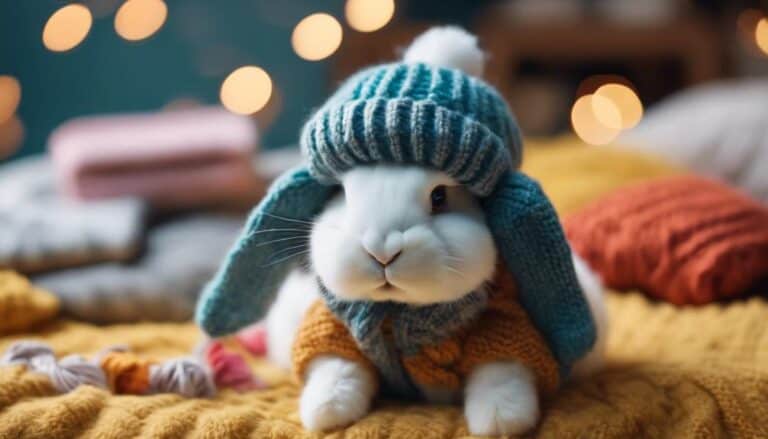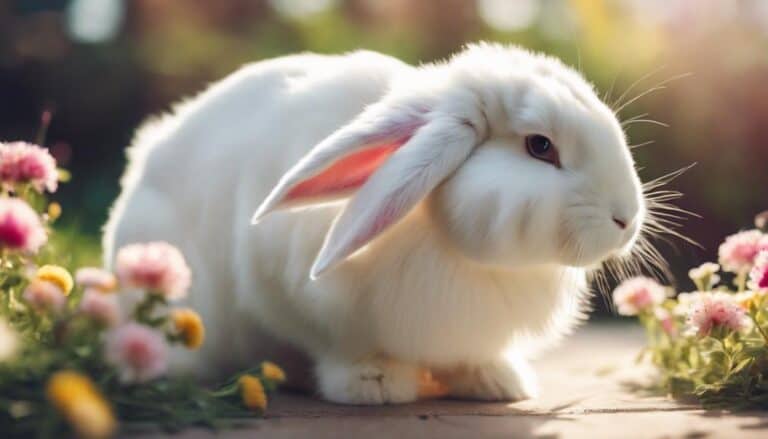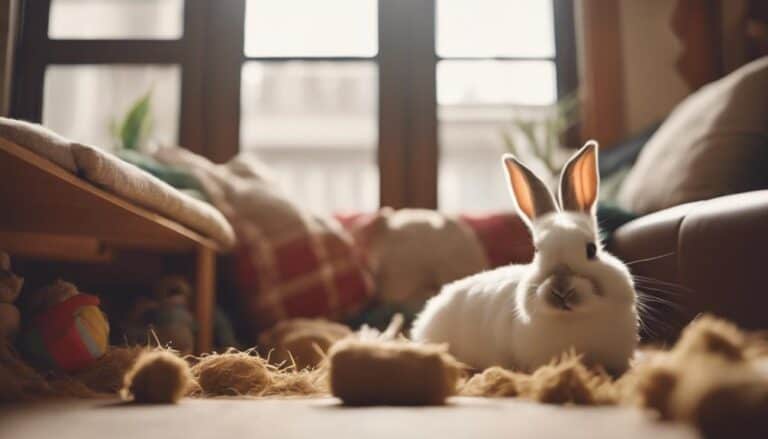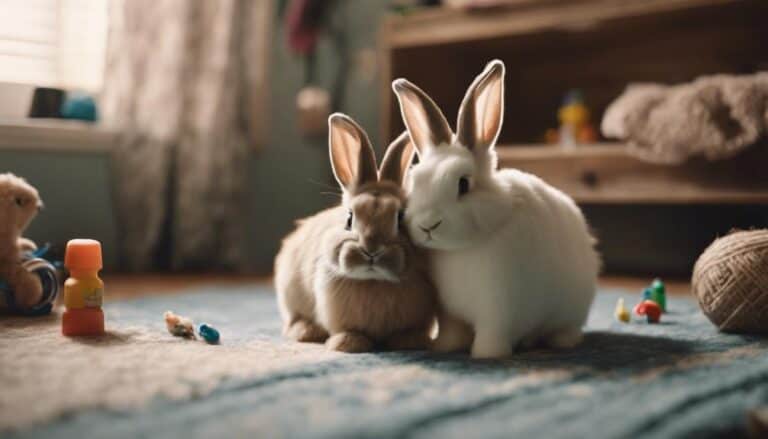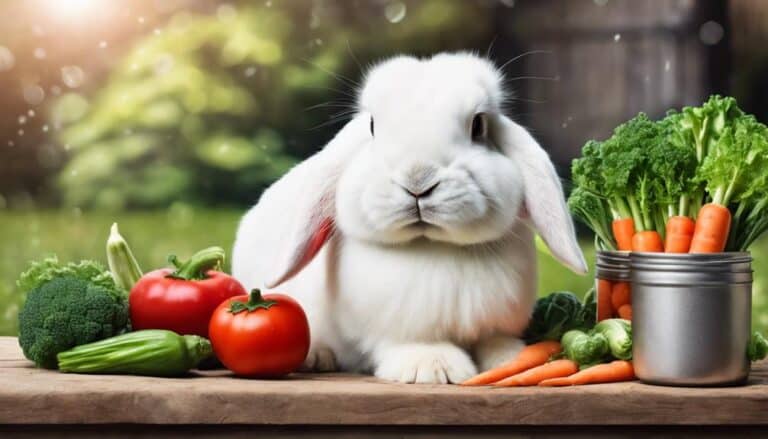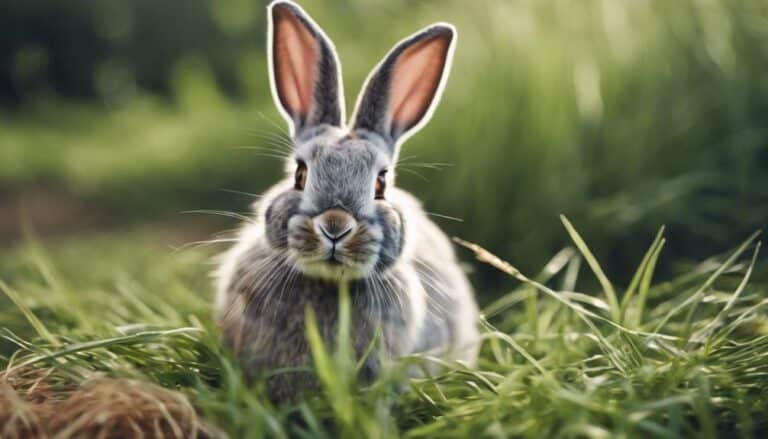Have you thought that your rabbit's fur loss on the sides of its mouth might be connected to dental problems? This is a pretty common cause, but there are other things to consider too.
Dental issues can definitely lead to fur loss around the mouth area. When your rabbit's teeth don't align properly or grow too long, it can cause discomfort, pain, and even lead to infection. This might result in your rabbit rubbing its face or mouth on surfaces, causing the fur to fall out.
However, dental issues aren't the only possible reason. Other factors, such as skin allergies, parasites, or even stress, could be contributing to your rabbit's fur loss.
It's essential to figure out the underlying cause of this symptom to ensure your rabbit's overall health and well-being. By exploring these potential causes, you can take the right steps to address the issue and help your rabbit feel more comfortable.
Contents
- 1 Key Takeaways
- 2 Dental Problems as a Cause
- 3 Urine Scalding and Fur Loss
- 4 Saliva Burn and Hair Loss
- 5 Identifying Skin Irritations
- 6 Importance of Dental Check-ups
- 7 Preventing Overgrown Teeth
- 8 Monitoring Saliva Production
- 9 Addressing Irritated Bald Patches
- 10 Seeking Veterinary Consultation
- 11 Environmental Factors to Consider
- 12 Conclusion
Key Takeaways
So you’ve noticed your rabbit is losing fur on the sides of its mouth and you’re wondering why. There are a few possible reasons for this. It could be due to dental issues, which can cause discomfort and lead to fur loss as the rabbit may be constantly gnawing or rubbing its mouth. Additionally, behavioral problems such as stress or boredom might result in excessive grooming or biting at its fur. If you’re concerned and asking yourself, “why is my rabbit biting,” it’s important to consult a veterinarian for a proper diagnosis and treatment options.
One reason could be dental problems, like molar spurs. These can cause your rabbit to drool, which in turn can lead to fur loss. The excess moisture from the drooling can irritate the skin, making the fur fall out.
Poor hygiene or a poor diet can also be to blame. If your rabbit's living area isn't clean, or if its diet isn't balanced, it can lead to urine scalding. This can cause fur loss around the mouth area.
Another possibility is skin irritations like dermatitis. This can cause fur loss around the mouth, and it's often accompanied by other symptoms like redness and itching.
Finally, there's something called saliva burn. This happens when the enzymes in your rabbit's saliva damage the skin, leading to fur loss. It's often seen around the mouth, and it can be painful for your rabbit.
Dental Problems as a Cause
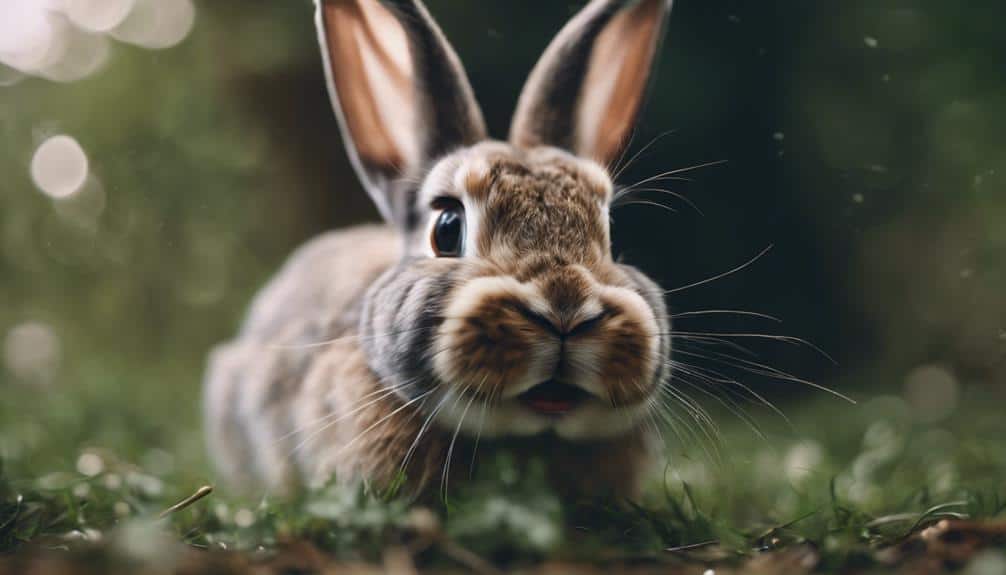
Dental problems can cause rabbits to lose fur, especially around their mouth and chin. This is often due to drooling, which leads to skin irritation. When a rabbit's teeth don't wear down properly, they can develop sharp points called molar spurs. These spurs can be pretty uncomfortable, so the rabbit will drool to try and ease the pain.
The excess moisture from all that drooling makes the fur around the mouth and chin mat together. This creates a damp environment that can irritate the skin, leading to fur loss in those areas.
Dental issues can also affect a rabbit's eating habits. The discomfort and pain can put them off their food, leading to weight loss. This weight loss can make fur loss and skin problems even worse, creating a vicious cycle of health issues.
Regular dental check-ups and proper care are crucial in preventing these dental-related fur loss issues in rabbits.
Urine Scalding and Fur Loss
If you notice your rabbit is losing fur around its mouth, chin, or eyes, there's a good chance urine scalding is the cause.
This happens when your rabbit's skin gets irritated from constant exposure to urine – especially if they've underlying dental issues.
To tackle urine scalding and prevent more fur loss, it's crucial to ensure your rabbit is eating a high-fiber diet and has access to fresh water at all times.
Regular check-ups with your vet are also a must to catch any dental problems early on.
Urine Scalding Causes
Urine scalding, which happens when urine stays on a rabbit's skin for too long, is a common reason why rabbits lose their fur. This causes skin irritation and inflammation, leading to hair loss in the affected areas.
One reason this happens is because of an incorrect diet. If a rabbit eats too many carbs, their poop gets softer. This means their skin is more likely to come into contact with urine, which can cause scalding.
Another reason is obesity. If a rabbit is overweight, they might have a hard time cleaning themselves properly. This means the urine stays on their skin for longer, increasing the risk of scalding.
Inadequate cage cleaning is also a problem. If the cage is dirty, the ammonia from the urine builds up and makes skin irritation and fur loss worse.
Knowing what causes urine scalding can help you prevent it in your rabbit. This leads to healthier skin and fur.
Fur Loss Remedies
So, you want to address fur loss due to urine scalding in rabbits?
First, make sure their living space is always clean and dry. This is crucial to prevent skin irritation and promote healthy fur growth. Regularly clean the rabbit's living area, paying extra attention to the litter box to minimize exposure to ammonia.
Use a non-toxic, odor-absorbing litter that can absorb moisture and reduce the risk of urine scalding. You might also want to consider providing a shallow litter box to prevent the rabbit from stepping in its urine.
Another thing to consider is dental issues. These can contribute to fur loss from urine scalding. If your rabbit has dental problems, take it to a vet to address the underlying cause. The vet can trim overgrown teeth and give you guidance on managing dental health to prevent drooling and excessive urination, which can lead to fur loss.
A balanced diet is also key. Feed your rabbit a diet rich in fiber and low in protein to prevent urine scalding. A healthy diet supports proper digestion, reducing urine concentration and the likelihood of skin irritation.
If the fur loss persists, take your rabbit to a vet to rule out any underlying health issues like kidney disease or bladder stones that may be contributing to the problem.
Saliva Burn and Hair Loss
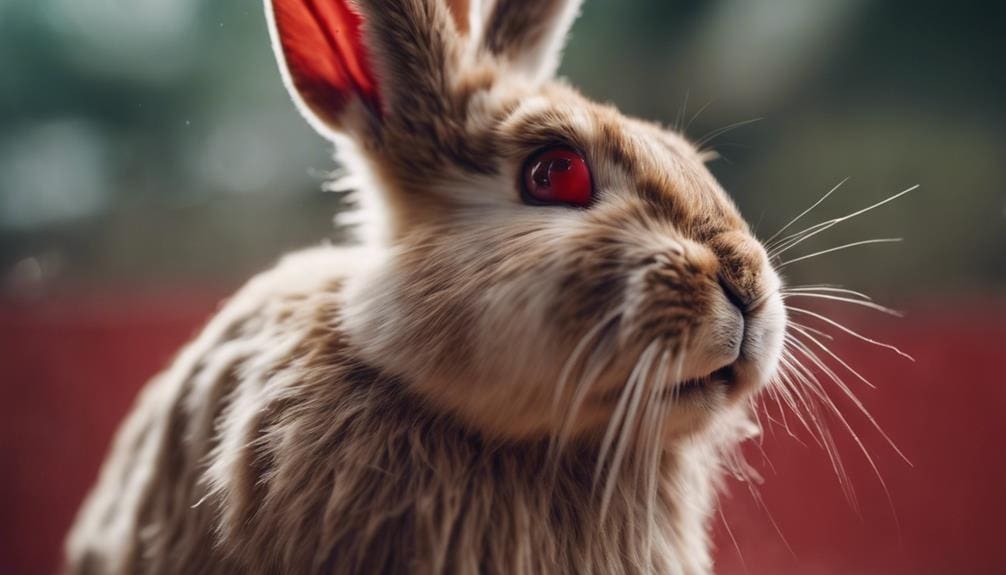
Saliva burn can contribute to hair loss in rabbits due to the enzymes present in their saliva that can cause irritation and damage to the skin and fur follicles. This condition is often seen around the mouth area where the saliva comes in contact with the fur.
When it comes to rabbit care, it's essential to ensure their living environment is clean and free from any potential irritants that could worsen the saliva burn. Regularly clean your rabbit's enclosure and provide a comfortable resting area. This will help prevent any further irritation and give your rabbit a clean space to live in.
Hair loss around the mouth can be a sign of saliva burn. So, monitor this area closely for any signs of redness, inflammation, or further hair loss. If you notice any of these symptoms, it's crucial to take action to address the issue.
If you notice abnormal fur growth or persistent hair loss despite addressing environmental factors, consult a veterinarian. They can provide specific guidance tailored to your rabbit's needs and may recommend topical treatments to soothe the affected skin.
Identifying Skin Irritations
If you notice any skin irritations on your rabbit, try to figure out what's causing them. It could be mites, a fungal infection, or an allergy. To get the right treatment, you need to know what's behind the problem.
A vet can help you with this. They'll examine your rabbit and come up with a plan that's just right for your pet's specific situation.
Fur Loss Causes
Identifying skin irritations in rabbits is crucial when dealing with fur loss. If your rabbit has bald patches, you need to figure out if there's a skin infection or irritation causing the problem.
When examining your rabbit's skin, there are three key things to look for.
First, check for redness or inflammation. Skin infections often show up as redness, swelling, or irritation. If you notice any of these signs, you might've found the source of the problem.
Next, look for flaky or scaly skin. Skin irritations like dermatitis can cause flaky or scaly skin. By feeling the texture of the skin, you can get a better idea of what's going on.
Lastly, assess for the presence of parasites. Parasites like mites can cause significant fur loss and skin problems in rabbits. Make sure to do a thorough examination to detect any parasites, and you'll be one step closer to fixing the underlying cause of the fur loss.
Treatment Options
So, what can you do to identify and address skin irritations in rabbits, particularly around the mouth area?
When it comes to skin and fur issues around a rabbit's mouth, there are various treatments to consider.
If your vet suspects syphilis, antibiotics might be prescribed to treat the infection. For ringworm, antifungal medications can help clear up the skin problems. In cases where dental discomfort is the culprit, addressing the underlying dental issues can alleviate the skin irritations. Providing your rabbit with a proper diet and adequate hydration can also aid in resolving skin problems caused by dietary deficiencies or dehydration.
Regular veterinary check-ups are crucial in identifying skin irritations early on.
Your vet can conduct thorough examinations to pinpoint the root cause of the problem and recommend appropriate treatments. Grooming your rabbit regularly can also help maintain skin health and detect any abnormalities promptly.
Importance of Dental Check-ups
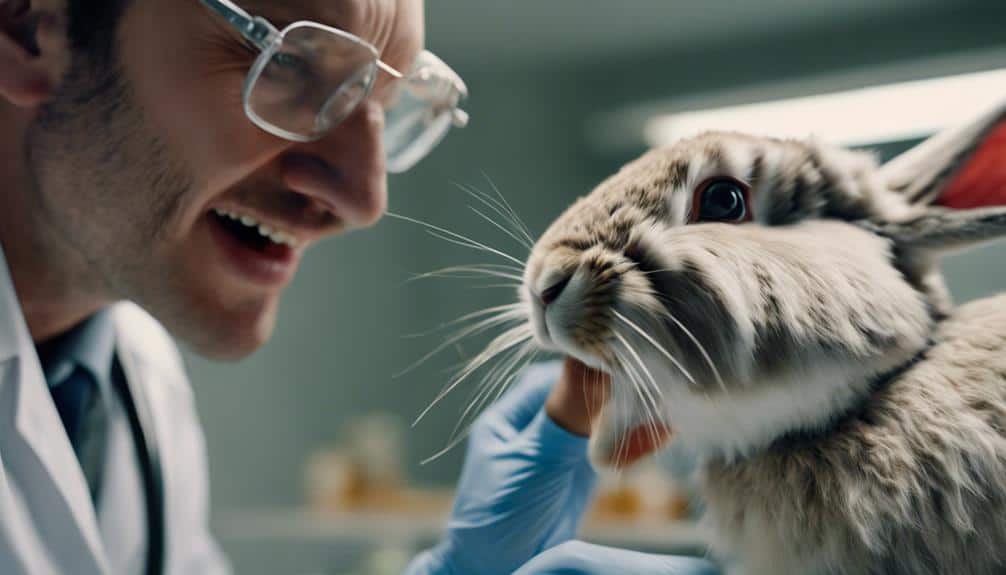
Regular dental check-ups are super important for your rabbit's overall health and well-being. If your rabbit has dental issues, it can affect their ability to groom properly, leading to fur loss and skin problems.
When it comes to your rabbit's dental health, there are three key points to keep in mind. Firstly, regular check-ups can help identify dental issues early on, such as overgrown teeth or dental malocclusions, before they become more serious problems.
This is crucial because if left untreated, these issues can lead to fur loss and skin irritation.
Secondly, addressing dental issues promptly through regular check-ups can prevent secondary problems from arising. For example, if your rabbit has difficulty eating due to dental issues, it can lead to malnutrition, weight loss, and skin infections.
Lastly, veterinarians can provide essential guidance on proper dental care for your rabbit. They can advise on teeth trimming or extraction if necessary, as well as recommend a diet and chew toys that promote good oral health.
Preventing Overgrown Teeth
To prevent overgrown teeth in rabbits, you need to take care of their dental health. If you don't, it can lead to serious problems like fur loss and difficulty eating. Rabbits' teeth never stop growing, so they need to wear them down somehow. If they don't, their teeth can get too long and cause pain.
One way to help them wear down their teeth is to give them things to chew on, like toys and hay. But even with these things, your rabbit still needs to see a vet regularly to check on their teeth. Some rabbits might've teeth that don't grow straight, or they might've genetic problems that make their teeth grow too fast. In these cases, a vet needs to trim and file their teeth to keep them from getting too long.
If your rabbit is having trouble with their teeth, you might notice some signs. They might drool a lot, lose weight, or lose fur around their mouth, chin, and eyes. Some rabbits are lucky and can wear down their teeth just fine on their own. But others need a little help from their owners to keep their teeth healthy.
The key is to stay on top of your rabbit's dental care. Take them to the vet regularly, and make sure they get their teeth trimmed and filed when they need it. If you do this, you can help keep your rabbit's teeth healthy and avoid problems like fur loss.
Monitoring Saliva Production
Monitoring saliva production in rabbits is a crucial aspect of their dental health and overall well-being. You want to keep an eye on how much saliva your rabbit is producing because it can provide essential insights into their health status.
So, how do you do that? Well, first, observe the wetness around your rabbit's mouth and chin. A healthy rabbit may have slight dampness, but if you notice excessive wetness, it could signal dental issues.
Next, regularly inspect your rabbit's fur for any bald patches around the mouth and chin. Fur loss in these areas could be linked to excessive saliva production due to dental problems.
If you notice a significant increase in saliva production or any concerning symptoms, don't hesitate to consult a veterinarian. They can perform a thorough examination and recommend appropriate treatment to address any underlying issues causing excessive saliva. It's always better to be safe than sorry, and catching potential problems early can make a big difference in your rabbit's health.
Addressing Irritated Bald Patches
When your rabbit has irritated bald patches, the first step is to figure out what's causing them.
There are a few common culprits: mites, fungal infections, or allergic reactions.
Once you know what's behind the problem, you can give your rabbit the right treatment to help their fur grow back and make them feel more comfortable.
Identifying Skin Irritations
Skin irritations on rabbits can lead to irritated bald patches, which can be a sign of underlying issues that need to be investigated and managed properly.
When it comes to identifying skin irritations in rabbits, there are a few things to consider.
Firstly, dental problems can cause skin irritations around a rabbit's mouth, leading to fur loss. So, it's essential to consult a veterinarian to assess your rabbit's dental health and rule out any potential problems.
Another thing to consider is hygiene maintenance. If your rabbit is drooling or has wetness around the mouth, it can result in skin irritation and fur loss. Keeping the area clean and dry can help prevent further irritation and promote healing.
Lastly, nutritional factors play a significant role in skin health. A rabbit's diet can make a big difference. Providing a high-fiber diet rich in fresh hay, greens, and water can help reduce the risk of skin problems and promote overall well-being.
Treating Bald Patch Causes
If your rabbit has irritated bald patches, you need to figure out what's causing them and treat the underlying issue. When the fur around your rabbit's mouth starts to thin out, it can be a sign of several problems.
One common cause of bald spots in rabbits is fur mites. These tiny parasites cause intense itching and fur loss, especially around the face and ears. Your vet may prescribe topical or oral anti-parasitic meds to tackle this.
Another reason your rabbit might be losing fur is dental problems. Overgrown teeth can be painful and uncomfortable, leading to excessive grooming and hair loss around the mouth. So, it's essential to keep your rabbit's dental health in check to prevent more bald patches.
Allergies or skin infections can also cause fur loss. To find the right treatment, you need to identify the specific allergen or pathogen through allergy testing or skin scrapings. This can guide targeted treatment options, like antihistamines or antibiotics. Working with a vet who knows rabbits can help you diagnose and treat the root cause of your rabbit's bald patches effectively.
Seeking Veterinary Consultation
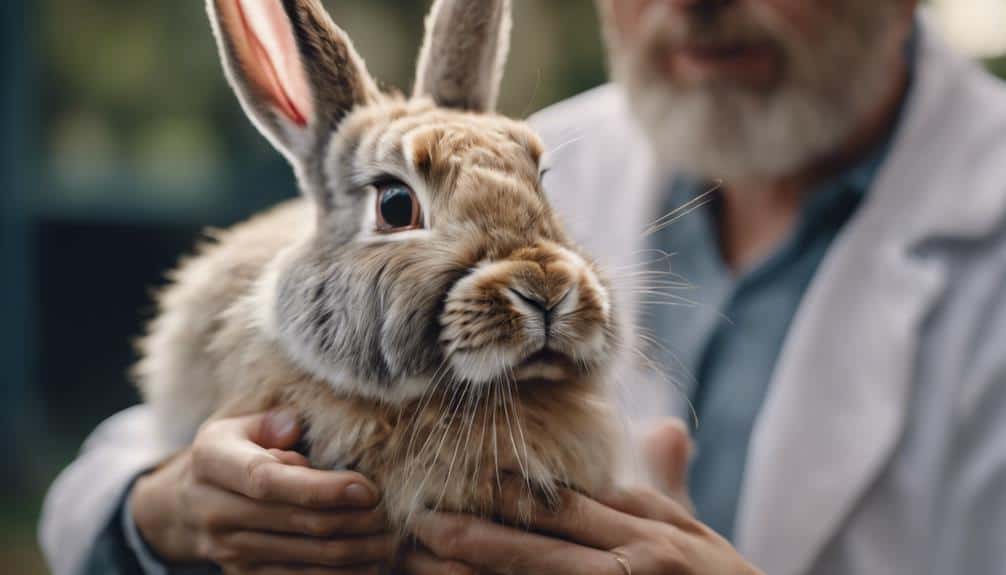
If you've noticed your rabbit is losing fur, it's essential to schedule a veterinary consultation as soon as possible. This will help address the issue effectively and get your rabbit back to their healthy, fluffy self.
A vet can do a thorough examination of your rabbit and provide a proper diagnosis and treatment plan.
There are three key reasons why seeking veterinary consultation is crucial in cases of fur loss in rabbits.
Firstly, a veterinarian has the expertise to identify the underlying cause of your rabbit's fur loss accurately. They can tell the difference between common issues like mites, dental problems, or skin infections, ensuring the most appropriate treatment.
Secondly, once the vet determines the reason your rabbit is losing fur, they can recommend a customized treatment plan. This might involve medication, dietary changes, or environmental adjustments to promote fur regrowth and overall health.
Lastly, addressing fur loss promptly through veterinary consultation can prevent complications that may arise from untreated underlying conditions. Early intervention can lead to a quicker recovery and better prognosis for your rabbit.
Environmental Factors to Consider
When addressing your rabbit's fur loss, it's essential to look at the environment they're living in.
One key thing to examine is the space they're in. Rabbits are super sensitive, and stress from things like loud noises, overcrowding, or not having enough space can cause them to lose fur, especially around their mouth area due to excessive grooming.
If you have multiple rabbits living together, another thing to consider is aggression or dominance issues within the group. This can lead to hair loss in certain areas. Make sure your rabbits have a peaceful and spacious living area to reduce environmental stressors.
Temperature and humidity levels in their habitat are also important to think about. Extreme temperatures or high humidity can trigger fur loss. By carefully looking at and addressing these environmental factors, you can create a more suitable and comfortable living environment for your rabbit, which might help alleviate the issue of fur loss.
Conclusion
Now that you know what might be causing your rabbit to lose fur on the sides of its mouth, you can start taking steps to fix the problem.
Your rabbit can have a full, healthy coat again and enjoy eating its favorite treats without any discomfort.
To get your rabbit back to its normal self, you'll need to get some guidance from a vet.
They can help you figure out what's going on and suggest the best course of action.
You should also keep an eye on your rabbit's oral health and make sure it's getting the care it needs.
With a little effort, your rabbit can regain its beautiful fur and feel happy and healthy again.

